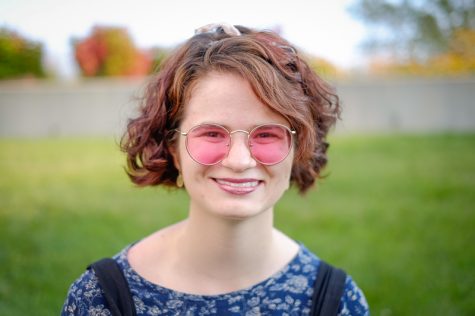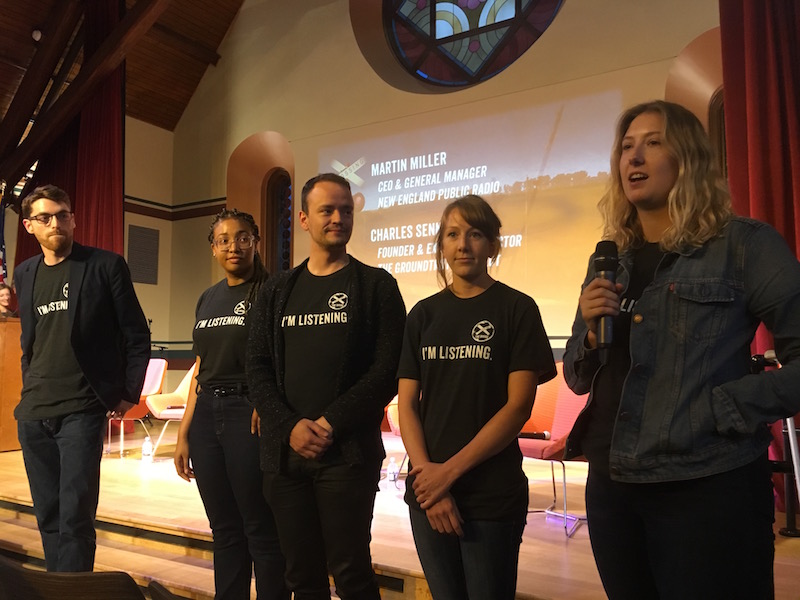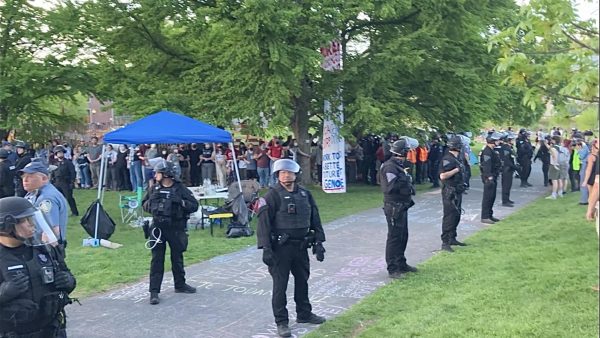Locals ‘Cross the Divide’ in GroundTruth panel
GroundTruth reporting fellows listen to a panel about community divides in the Pioneer Valley at UMass Amherst. The reporters will embark on a cross-country journey to report on issues dividing the country. The fellows are (from left) Eric Bosco, Mahlia Posey, Gabriel Sanchez, Rachel Cramer and Brittany Greeson. (Stephanie Murray/Amherst Wire)
AMHERST ― Residents of the Pioneer Valley impacted by by divisive differences in the community spoke about their experiences living and working in Western Massachusetts during a panel hosted by the GroundTruth Project.
The event, “Crossing the Divide: The Pioneer Valley in a Divided America,” took place Wednesday evening in the University of Massachusetts Old Chapel as part of the GroundTruth Project’s cross-country reporting tour, Crossing the Divide, sponsored locally by New England Public Radio and WGBH.
UMass graduate Charles Sennott, a former combat reporter and founder of the GroundTruth Project, moderated the panel. Sennott brought together five residents of the Pioneer Valley to share their experiences with the education and media landscape in their community.
Panelist Angelica Merino, a recent graduate from Holyoke Community College, shared her experience as an undocumented immigrant and a recipient of the Deferred Action for Childhood Arrivals program living in the Pioneer Valley.
Merino talked about the difficulty of having to pay out-of-state tuition despite residing in Massachusetts. DACA recipients are able to attend college in the U.S. but often do not receive the same treatment as other residents who have their full citizenship.
Eduardo Samaniego, a Hampshire College student attending the event, asked Merino why she thought the DREAM Act hadn’t passed in the Massachusetts Legislature.
Merino said she was unsure why Massachusetts has not passed the act and encouraged the state to pass a DREAM Act similar to the one passed in Connecticut that would allow undocumented students to pay in-state tuition at public universities. She also encouraged UMass Amherst to step up their efforts to provide scholarships for DACA recipients and other undocumented students.
James Terapane, a panelist, machinist, and the director of the Museum of Our Industrial Heritage, talked about changes in Pioneer Valley industry, pointing out that new technology and factory closings have disrupted the local industrial landscape. Despite the loss of jobs in the area, Terapane is not pessimistic.
“This region we’re in is very resilient because of its diversity,” said Terapane. “There’s a lot of hope here.”
Ray Suarez, a visiting professor at Amherst College and seasoned journalist, spoke to the current media climate both in the Valley and the nation. Suarez and Sennott said part of the problem was that the old business model for journalism had failed.
“The news business has really plummeted in public esteem and public credibility,” Suarez said.
Suarez pointed out that the way people consume media has changed over the past several decades, in large part because of widespread use of the internet.
“Because of the trail of the last 60 years, we’ve broken up a mass audience into tiny mosaic tiles,” Suarez said.
Suarez explained breaking up news sources has led to people access to different information, some accurate and some inaccurate.
“That leaves us unable to stand on the same ground,” Suarez said.
Email Faith at [email protected] or follow them on Twitter @FVGrego.

"Journalism without a moral position is impossible. Every journalist is a moralist. It's absolutely unavoidable." -Marguerite Duras
Email at [email protected]...










